What is the Jesus Prayer and how old is it? Who is the Jesus Prayer for? Where can the Jesus Prayer be found in Scriptures, and how does it differ from the mantras of eastern traditions? How ought we to practice the Jesus Prayer, and what do we find when we do?
The present article is the fifth lecture in the series: “Prayer of the Heart in an age of technology and distraction” delivered by Fr. Maximos (Constas) in Feb. 2014 to the clergy of diocese of LA and the West of Antiochian of N. America at the invitation of His Eminence Metropolitan Joseph. The audio version of this lecture first appeared on Patristic Nectar Publications, and is published here by permission.
Fr. Maximos is the presidential research scholar at Holy Cross Greek Orthodox School of theology in Brookline, MA. He is an Athonite monk, one time professor at Harvard Divinity School, accomplished author and translator and lectures internationally in both academic and parochial venues.
* * *
This talk is about the Jesus Prayer, something that we all know about and hopefully something we all practice, but as I said earlier it’s good to go back to the roots of things and to refresh, and there might be some who know little about this.
It’s been said that prayer is our true life. Prayer is our highest task and communion with God. Without prayer we become disconnected from our inner depth and we lose something of our basic humanity. Without prayer we become dead inside. One early Christian writer said, “When I stopped praying I became old and when I prayed I became young again.” Youthfulness and old age are not just physiological conditions but also spiritual. Even a young person can feel old. St. Ephraim the Syrian said that when a person is terminally ill and he stops eating, his friends know that death is near. And when the angels see us refraining from the nourishment of prayer and the Eucharist they begin to grieve because our souls are dying. It’s a very powerful image and it says a lot about what prayer is, and the cosmic consequences that a life of prayer, or not, have in the spiritual world.
To pray is to open oneself up to the source of Divine life. The ascetical writers talk about closed and open hearts, and the person who has not received God or been aware of Him in some way is someone whose heart is closed, but a person who has been transformed to a certain extent is one whose heart has begun to open. St. John Chrysostom talks about larger and smaller hearts. Some people’s hearts are so small they have no room for anybody else. Other people have larger hearts and there’s room for their family members, and St. John says that St. Paul’s heart was so big that it contained the whole world. Imagine having such a heart that can embrace everyone and everything. Most of us have ever-shrinking hearts. Its’s not because we’re evil, but it’s because we’ve been hurt and we put up defenses and so it’s hard for the heart to be what it’s meant to be naturally. But to pray is to open the heart to the source of Divine life. To pray is to cast off the unreality of our troubled thoughts, which is a fantasy world, and enter into reality. The distractions are also the fragmentation of the self—double and triple lives, with lies covering up lies. Prayer restores our lost unity and where there is unity, whether in an individual, family, or parish, we can be sure that people are praying. Where there is no unity but only quarreling we can be sure there is no prayer. There are many forms of prayer—written prayers, spontaneous prayers, but we’re focusing on here one of the most beloved and powerful prayers.
What is the Jesus Prayer? It is the ceaseless repetition of the words “Lord Jesus Christ, Son of God, have mercy on me, a sinner.” There are shorter versions of the prayer such as “Lord Jesus Christ have mercy on me,” or even just “Lord Jesus have mercy on me.” Different people find different versions that better express themselves, but what’s common to all of these is the Divine name of Jesus.
Who is this prayer for? The Jesus Prayer is for everyone, not simply for monks and nuns. I told you that St. Nikodemos says in his introduction to the Philokalia that the Jesus Prayer is for everyone.
How old is the Jesus Prayer? If you ask historians this question the earliest written evidence for the practice of the Jesus Prayer is found in a text called A Discourse on Abba Philimon which is the only narrative text in the Philokalia. This text tells the story of Abba Philimon who was an early Egyptian desert father. It’s probably from the fifth or sixth century, but it describes the Jesus Prayer as already well-established. In Tradition the Jesus Prayer is much older. One of the fathers reminded me the other day that the prayer of the Blind Man is like this: Lord Jesus, Son of David, have mercy on me, and of course the book of Acts places heavy emphasis on the name of Jesus, so there are Biblical forms of the Jesus Prayer. 1 Thess. 5:17 says pray without ceasing, which from Christian antiquity has been taken as a charge to ceaseless prayer and especially the Jesus Prayer. St. Anthony entered the church and heard If thou wilt be perfect go thy way and sell all that thou hast and come and follow Me and those words became a spur or goad for him. In the nineteenth century classic, The Way of a Pilgrim, the pilgrim goes into church and hears 1 Thess. 5:17, and that is what stirred something inside him and put him on the search for the Jesus Prayer. That book is such a tremendous text.
New Testament scholars would never accept this, but the Church has accepted that 1 Cor. 14:19, where St. Paul says I would rather speak five words in or by means of my mind (in the Greek he uses “nous”) rather than thousands by means of the tongue, refers to the five words of the Jesus Prayer in Greek: “Kyrie Eleison Iesou, eleison me.” Scholars would scoff and say this is forced, but it fits, and many great saints of the Church such as St. Gregory cite this. So I think it’s incumbent upon us to accept it at least as a pious tradition. We don’t need this verse to be our proof-text, but it’s a pious tradition, and an intriguing one at that.
It seems clear that the very practice of the Jesus Prayer reflects the Biblical teaching of the nature of personal names, and especially of the Divine Name. We all know that the name is closely linked to the person that bears it so that to invoke the name is to invoke the person who bears it. So it’s logical that when there is a change of life there is also a change of name—Abram becomes Abraham, Simon becomes Peter, Saul becomes Paul, and monks and nuns receive new names in monastic tonsure, because the name is so deeply tied to personal identity. A name is not arbitrary or random but conveys the essence as it were of the thing or person. When Moses asks God, “What is your name,” he’s not asking God, “What should I call you,” but he’s asking, “Who are you?” If one profanes the name he’s not harming a word, but rather the person who is named by it, and we all know about the name that observant Jews have for the name of God. The other day I talked about St. Symeon the New Theologian pressing his eyes to the page of Scripture after the reading because of this devotion to the word, which is a verbal icon.
There was a senior seminarian quiz before graduation: “What is the difference between the Gospel on the altar and the icon of Christ in the dome?” and the answer is: “location.” St. Theodore the Studite says this in his own way. One is a verbal representation of Christ and the other is a visual representation of Christ. Word and image, and acts, and gestures of ritual are all modes of revelation. 1 Phil. 2:9-11 says, Therefore God has highly exalted Him and bestowed on Him the name that is above every name—and in the Greek it even means that which transcends every name—so that at the name of Jesus every knee should bow in heaven and on earth and under the earth and tongue confess that Jesus Christ is Lord to the glory of God the Father.
How to say the Jesus Prayer? We are encouraged to begin by saying the Jesus Prayer aloud. This is what is called the prayer of the lips. Even for those who have been saying it for years it can help with concentration, although at other times it hurts concentration—it all depends on where you are—but it’s not only for beginners to say it aloud. Anybody who’s done this and repeated it aloud knows that it gets tiring. Very quickly and naturally what began as a prayer of the lips will on its own begin to repeat itself inaudibly in our minds. I think that’s a natural, human transition but God is also active here. There are so many other things we can’t remember, but the Jesus Prayer attaches itself to us more quickly and deeper, and it goes from the lips to something internalized. By God’s grace and our effort the prayer will enter more deeply so that the prayer of the lips and mind will become the prayer of the heart in the core of our being. Those who practice this will realize right away because we’re so used to the scattered, fragmented life we will easily float away from the prayer without even realizing it. That happens all the time, and when it happens don’t get upset or angry—just gently recall your attention to the heart and continue to say the prayer without even thinking about what happened. Expect that this will happen and know it’s not a huge problem. Just bring yourself back to the work you were doing.
The first thing we need to do is return the attention to yourself, first to the mind and then to the heart to unite these divided aspects of ourselves—a reintegration of the self, in its core, in its root. Once we have entered the place of the heart and found that place of silence within ourselves, the idea is not to sit there in Buddhist nothingness, but from that place of the heart to say the Jesus Prayer with gentle but unwavering concentration as much as we’re able. Don’t pressure yourself or have expectations of praying for hours. Start small and see what happens, ideally under the direction of someone who is more advanced who can encourage and guide you.
In the Orthodox spiritual tradition and in the Bible the heart is the center and core of our being, and there’s a lot of biological information that backs this up. In the human fetus the cardiovascular system is the first to form and there are beating cardiac cells within the fetus twenty-one days after conception. That is long before the brain and the nervous system are formed, and neurologists tell us that the brain does not complete its own formation until at least three years after birth. The brain is a latecomer to the anthropological landscape. And cardiac cells are the only cells that don’t divide, which means those that start beating on day twenty-one will continue to beat for your entire life. People ask where miracles are today, and to me this is astonishing! We’re talking about things so small that they can’t be seen. Where does that life come? It's very remarkable.
It seems very clear that the heart is the center of the biological organism. It’s like the seed out of which the rest of the person grows. I mentioned chapter ten of St. Nikodemos of On Guarding the Mind and the Heart where he says that the mind is always active, and some people even define the mind as activity. Sometimes we can’t sleep at night because the mind is racing. He says all of that activity, which in Greek presupposes a source, has its root in the heart, and in the Gospel we hear about all the things that come out of the heart—lust and pride, etc. The mind is an externalization of the heart in a sense. Its root and potentiality is in the heart and the actualization of it is what we experience in the heart. When we talk about descending with the mind into the heart all that means is to relax that activity of the mind and allow this energy that has unfolded to be en-folded back into its source. This is what it means for the mind and heart to come back together again.
There’s a great Byzantine tradition of the memorial services concerning the third, ninth, and fortieth days, that as the body is formed in the womb, from seed to fully-formed body, so it is undone or dissolved in the opposite direction at the moment of death. They believed that the last thing to be formed in the body is the first thing to go, and that is the face. The fullness of the definition of the face is the last thing to be formed which means it’s the first thing to dissolve. At the moment of death you immediately see the blood rush from the person’s face and his features change, and then the rest of the body subsequently. On the third, ninth, and fortieth days key parts of the body break down as if the soul is somehow uncoiling itself. On the fortieth day, the last thing to go is the heart. This is a pious tradition, but it’s not the reason for the memorial services, although it’s very intriguing and consistent with the other things I’ve been saying. Not only is the heart the natural core of the person, it’s also the super-natural center of the person. When I was a seminary student you couldn’t use the world “supernatural” because it’s “scholastic.” It’s like, if the Catholics say it then we can’t say it, but to define yourself in a negative dialectic is what the Protestants do. If you read the fathers of the Church and the Byzantine ecclesiastical writers they use the words “physikon” and “hyperphysikon.” Maybe they mean something different by it but the words themselves are perfectly Orthodox.
So the heart is also a supernatural center, because that is where the seed of the Holy Spirit is implanted within us. Where else would it go? It’s also a kind of para-natural center, because the heart is also the place where all the negative things arise from, too. To discover one’s heart is an act of reintegration, and when the heart and mind are reunited it’s an experience of tremendous spiritual joy and delight. The image that St. John Climacus uses is that it’s like a man returning home after a long journey and embracing his wife and children. We see often on the news about soldiers returning home and embracing their wives and children and it’s so tremendously powerful to see. Imagine that as an image of what takes place when all your fragmented and dispersed thoughts and wandering mind are reconnected to the deeper part of yourself.
I’d like to say a few words about the breathing practices that are associated with the Jesus Prayer because I think this is one of the most misunderstood things. People sometimes warn people about this, which I don’t agree with. As we’ve said over and again, it’s not easy to free ourselves from distractions. One priest friend said we can’t even say one single Jesus Prayer without being distracted. How wretched are we? We know it’s hard to not be distracted. It’s difficult to find our center and enter the place of the heart and once we do enter it it’s very difficult to stay there because the cares of life distract us. This is why the teachers of the Jesus Prayer teach us to initially focus on the breath. If the mind focuses on the breath that means the wandering mind, which has been outside of the body, is now united to the body, and that’s a huge first step, because so often we’re absent from the present moment. You can live your whole life without actually having lived it. Focusing on the breath is important because it brings the mind back to the body, and also because the breath is the one thing that we have that is unambiguously in the present—right where and right now. If I can get my mind to focus on the breath I’m not only entering into my body but I’m also entering into the present. It is so tremendously powerful to be in the present. It can be frightening because it’s a place we’re not familiar with, and I think that’s one of the reasons we run from it. It can be overwhelming. We sense there are other things in the present too, namely the presence of God. And this reality is so big, awesome, and so mysterious that I can’t deal with it so I go back to the my own little reality—my paper I’m working on, or the party I’m planning—the smaller reality that I can control and manipulate. In so many churches there are so many activities—even doubling their talks and programs during Lent. How about just stopping? What are we running away from?
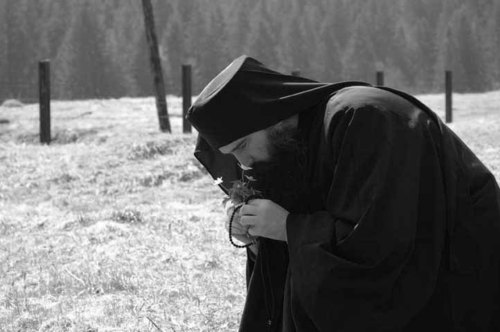
As St. Nikodemos says, breathing is respiration which involves the lungs and heart; and to follow the breath is not only to return to the body and to the present, but it’s to allow the mind to return to the place of the heart. People discourage this for different reasons, but breathing is something we do all the time; and if you’re saying the Jesus Prayer in a rhythm, to me it’s the most natural thing that this repetition will on its own very quickly unite itself to your breath. I don’t know how that can’t be. Many people will say the first half of the prayer on the inhale, and the second on the exhale, and this is what’s recommended in the Philokalia and elsewhere. While inhaling: “Lord Jesus Christ, Son of God” and while exhaling: “have mercy on me a sinner.” The prayer becomes part of people’s breathing, and sometimes you just take a breath without intending to pray, and you find yourself saying the prayer because it unites itself to your breath. This should be basic.
We talked about the buried seed and the idea of actualizing the potential of the Holy Spirit, and the Jesus Prayer is precisely this cultivation. Why? 1 Cor. 12:3 says No one can say Jesus is Lord except by the Holy Spirit. It’s not a mantra, but the invocation of the Divine name; and like an icon, with the name comes the presence of Christ. How is the presence of Christ actualized in the world? Through the agency of the Holy Spirit, always. If Christ is present somewhere it’s due to the activity and agency of the Holy Spirit. Think about the Annunciation—the Archangel delivers the message and she asks, How can this be?” Well, simple—The power of the Most High will overshadow you. We say in the Creed “begotten of the Holy Spirit and the Virgin Mary.” The Second Person of the Trinity becomes a reality incarnate in her womb through the agency of the Holy Spirit. That’s how Luke begins his Gospel, and he begins the Book of Acts with the apostles gathered in Jerusalem, where Christ told them to stay, awaiting power from on high. The Spirit descends on them and transforms them from a ragtag group of blue-collar workers into the Body of Christ. We have two parallel moments in the works of Luke—the overshadowing power of the Holy Spirit that concretizes the presence of Christ, and the overshadowing at Pentecost which concretizes the mystical Body of Christ.
At every Liturgy, again the material of the Virgin’s womb is transformed, the material of the apostolic body, the material of the bread and wine that we place on the altar. In the epiclesis we invoke the Holy Spirit to transform the gifts and “make them the Body of Your Christ.” No one can say “Jesus” without the Holy Spirit. That’s just not a simple, sweet idea. There’s a profound depth of theological meaning here. This is why we have the image of the Spirit as the seal. When the seal comes and impresses itself into matter, it doesn’t leave an image of itself—you aren’t left with an image of a rubber stamp. You’re left with the image that the seal bears. And the image here is that of Christ. The Spirit is the seal but the image on the seal is Christ, which is why the sealing of Baptism transforms the baptized into a Christian—it’s a christification. The invocation of the name of Jesus in the Jesus Prayer and the presence of the Holy Spirit in the heart are intimately connected.
People often say, “Well, this sounds good, but I don’t have time for this. I’m a busy man!” I understand that we’re all very busy today, but let’s be careful that when we say “I don’t have time,” which was the mantra at Harvard, that we don’t really mean, “I don’t believe in the possibility of my own transformation.” I seem to never have time for certain things, but I find all the time in the world for the things I use to amuse myself.


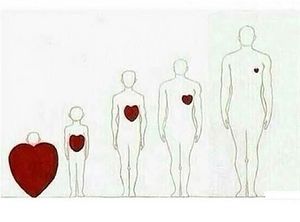
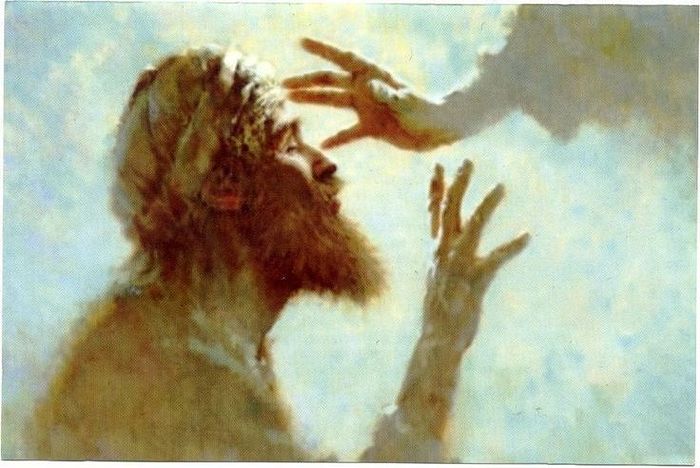
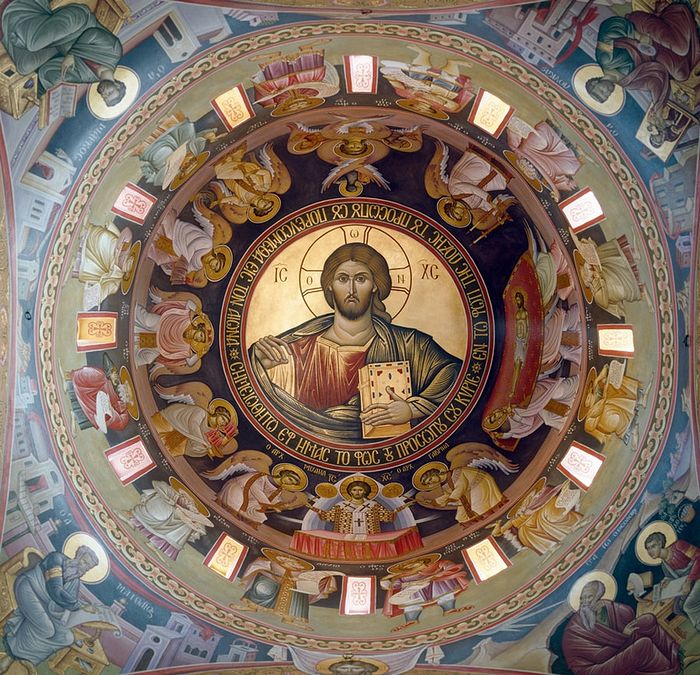
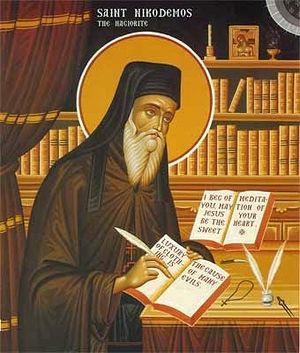

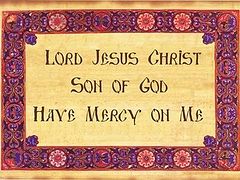
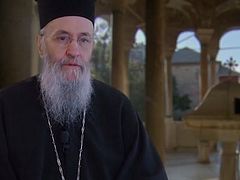
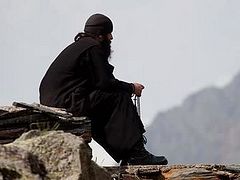
The book "Mountain of Silence" by Kyriacos C. Markides was very highly recommended to me, and although I have not had time to read it, I think it may be right up your alley ;)
The Holy Cross bookstore has many titles you may not be aware of (a search for "nous" turned up only one: Repentance and Confession - Spiritual Life Series vol. 1 by Hieromonk Gregorios).
Also, this article may be helpful to you: http://oodegr.co/english/psyxotherap/Therapeutic_Treatment_ofthe_Human_Nous.htm "... Angels have intelligence and nous, whereas men have reason - both logos and dianoia - nous and sensory perception. This follows the idea that man is a microcosm and an expression of the whole creation or macrocosmos. ..."
Friends have asked me, "After all that you have been through, how can you still love?"
How can I not? I was blessed with a heart bigger than I am, and Christ Jesus sees me through every attack and has restored everything the enemy tried to steal!
Proverbs 13:10 tells us that pride leads to conflict/strife; and many passages make it very clear that we are to be dead to our flesh and alive in Christ (2 Corinthians 5:14-15; Luke 17:33; Matthew 10:45 and 16:25; Colossians 3:3; 2 Corinthians 5:17; etc.), including Galatians 2:20, in which Paul tells us, "My old self has been crucified with Christ. It is no longer I who live, but Christ lives in me. ..."
With the Savior alive in our hearts and minds, how could we do anything but love even those who hurt and betray us?
May God bless you all and keep you in His peace.
Thank you for such helpful words. I have been trying to think of myself in more integrated terms than as a person who has a mind, body, or heart. But that what I am IS the sum of those parts, and the division of which leads to death. That being said, would you please explain the idea of the "nous". I have read "The Way of the Pilgrim," and even began a book of letters by St. Joseph the Hesychast; a monk from Mt Athos who departed in the 1950's, I believe. My specific question is: How/what should I considering the nous to be? Is it the heart, or the mind, or the resulting "place" of being which comes when the mind has descended into the heart and abides therein? Perhaps my question reveals the 'dis'integrated thinking I am trying to depart, but any words or resources would be appreciated.
In Christ,
Kyle